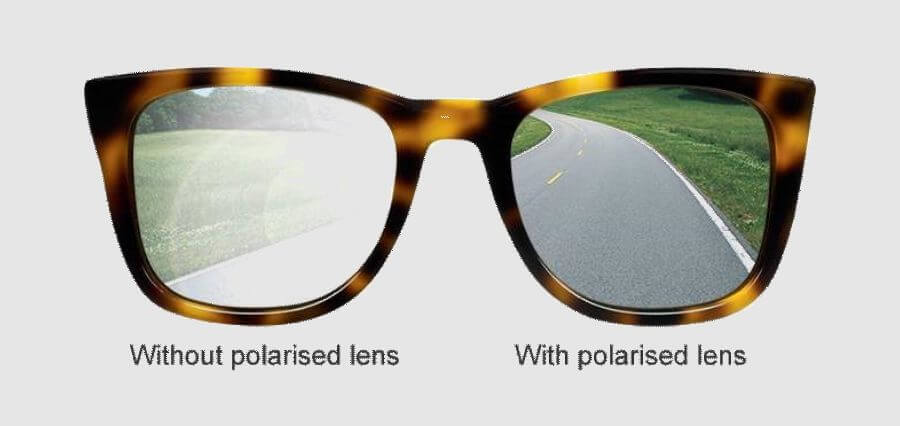Sunglasses are more than just a fashion statement; they serve a functional purpose by protecting our eyes from harmful UV rays and reducing glare. The distinctions between polarized and non-polarized sunglasses are essential to understanding what fits your needs best. This post will guide you through their differences, benefits, ideal use cases, and the allure of retro polarized sunglasses.
A Brief History
Discover the fascinating journey of sunglasses from their ancient origins to the modern era, including a revival of classic styles.
Early Origins
In the ancient world, people used primitive sunglasses with flat panels to shield their eyes from the sun. These were not like the trendy sunglasses we know today but served the essential purpose of blocking bright sunlight.
The Evolution of Modern Glasses
Through the centuries, eyewear evolved, with developments in lens technology and design, turning them into both a fashion accessory and a tool for vision protection. Innovations in both polarized and non-polarized lenses have contributed to this evolution.
Nostalgia and Retro Styles
Today, the best retro sunglasses capture our imagination by harkening back to classic styles. The resurgence of retro sunglasses for men and women alike has brought back timeless designs, reflecting both nostalgia and contemporary fashion trends.
Technical Differences
Explore the core distinctions between polarized and non-polarized lenses, focusing on their underlying mechanics and specific functions.
- Polarized Lenses – Sunglasses that are polarized have a unique filter that blocks horizontal light waves, reducing glare. Imagine driving on a sunny day; the reflection off the road can be blinding. Polarized lenses help in filtering this glare, allowing for clearer vision. It’s like having a miniature set of blinds within your glasses, selectively blocking distracting light.
- Non-Polarized Lenses – Unlike polarized lenses, non-polarized lenses minimize brightness but don’t selectively reduce glare. They are suitable for regular use where intense glare is not an issue. For those who are not frequently engaged in outdoor sports or driving, non-polarized sunglasses might be the preferable option.
Benefits and Drawbacks
Learn about the specific advantages and potential shortcomings of both polarized and non-polarized sunglasses to make an informed decision.
Polarized Lenses
Polarized lenses are renowned for their glare reduction, clarity of vision, and suitability for activities like fishing or driving. They’re especially effective near reflective surfaces like water. However, they may cause distortion in viewing digital screens and might not be suitable for pilots or those who need precise color recognition.
Non-Polarized Lenses
While less effective in glare reduction, non-polarized lenses are generally more versatile for everyday use. They’re often more affordable and work well for casual wear. On the downside, they may not provide the clear vision you might desire in intense sunlight or specific outdoor activities.
Visual Perception Impact
Visual perception is deeply affected by the type of lenses we choose. This section will illustrate the real-life impact of polarized and non-polarized lenses through vivid scenarios.
Polarized Lenses
Using vivid scenarios, let’s explore the impact of polarized lenses. Picture yourself fishing by a lake; the reflection off the water’s surface can be overwhelming. Polarized lenses cut through this glare, allowing you to see beneath the surface. It’s like removing a veil from your eyes, enhancing your outdoor experience.
Non-Polarized Lenses
Contrastingly, non-polarized lenses won’t offer the same level of clarity near reflective surfaces like water. While still reducing brightness, they may not be the best choice for activities where glaring is a significant concern, such as skiing or boating.
Retro Sunglasses: A Trend Revival
Delve into the resurgence of retro styles, exploring the timeless appeal of these designs and whether they commonly use polarized or non-polarized lenses.
Retro Styles and Their Charm
The world of fashion often looks to the past for inspiration, and eyewear is no exception. Retro sunglasses for men and women, too, have made a comeback, blending vintage charm with modern technology. These classic designs have a timeless appeal that transcends fleeting trends.
Polarization in Retro Sunglasses
Interestingly, polarized retro sunglasses have become increasingly popular. They offer the allure of classic style with the added benefit of glare reduction. While not all retro designs feature polarization, this combination has become a go-to choice for those seeking both fashion and function.
Choosing Your Sunglasses
A pair of sunglasses is more than just an accessory; it’s an extension of your personality and lifestyle. Here’s how to choose the right one for you.
- Consider Your Lifestyle – Your daily activities play a vital role in choosing between polarized and non-polarized lenses. If you’re an outdoor enthusiast or spend significant time driving, polarized lenses may be the right choice. However, casual users might find non-polarized lenses to be adequate.
- Aesthetic Preferences – Fashion matters, too! If you’re drawn to the best retro sunglasses, you’ll find options in both polarized and non-polarized varieties. Your choice can reflect both your visual needs and your personal style.
- Specific Needs and Requirements – Consider your specific needs, such as eye care or visual requirements. Consult with an optometrist if needed to ensure your eyewear fits your unique visual needs, whether that involves polarization or not.
In your quest for the perfect pair of sunglasses, understanding the differences between polarized and non-polarized lenses is essential. This guide has explored these distinctions, benefits, ideal use cases, and the allure of retro styles.
You are now empowered to make an informed decision on your next pair of sunglasses, taking into account your lifestyle, aesthetics, and specific needs without favoring any particular brands. Happy sunglass shopping!


